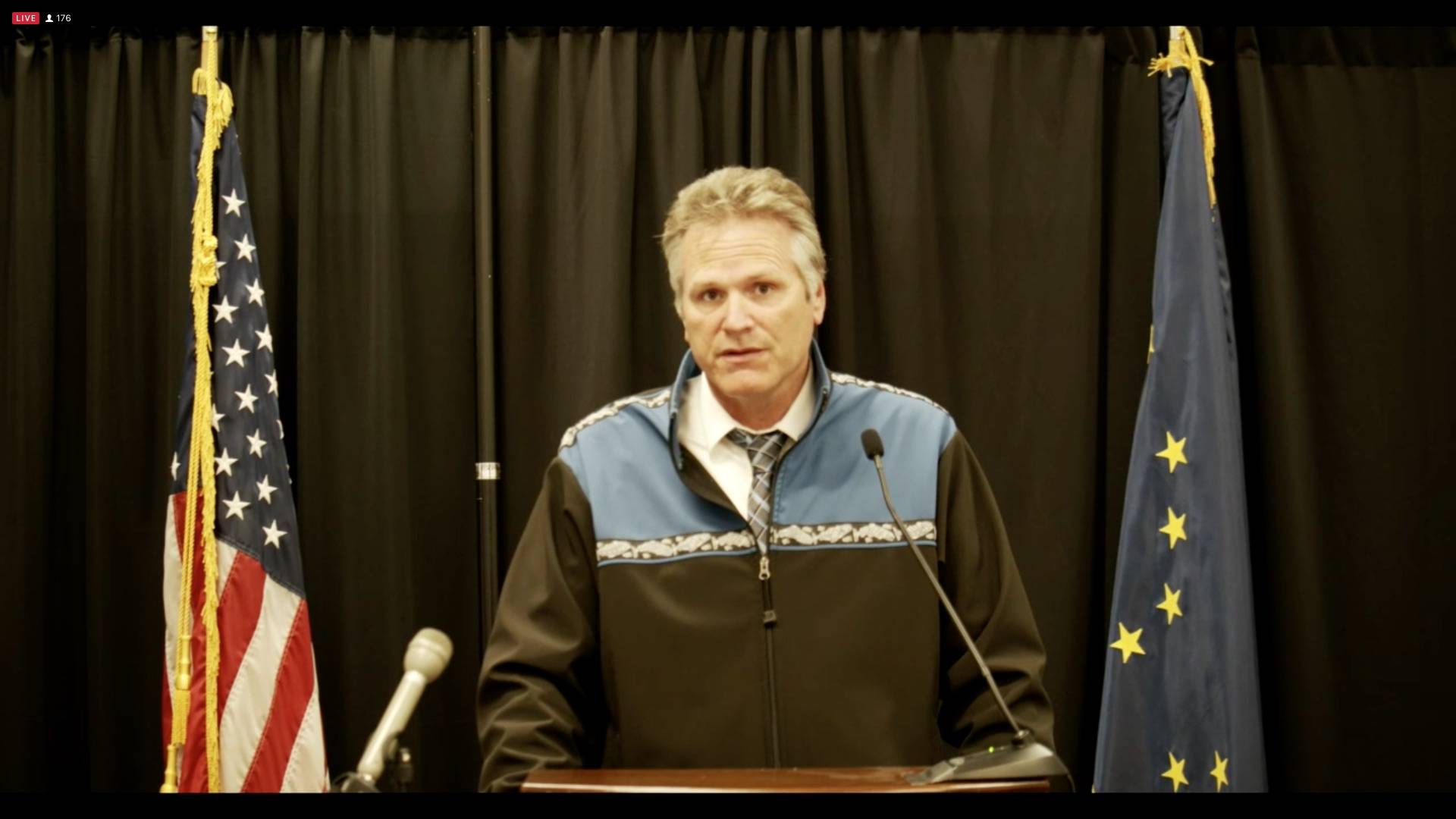Gov. Mike Dunleavy on Thursday night pleaded with Alaskans to help mitigate the state’s strained hospital system.
“The hospital capacity has become very, very constrained here in the state of Alaska, as it has in many other states and across the world,” Dunleavy said during a press conference held at the Atwood Building in Anchorage.
The strain isn’t necessarily due to a shortage of hospital beds or ventilators, Dunleavy said, but rather a shortage of hospital staff that is being exacerbated by the spread of the delta variant and a general increase in the number of people seeking treatment, among other things.
Alaskans can help, Dunleavy said, by being mindful of that strain when participating in dangerous outdoor activities and scheduling elective surgeries with their doctor.
“What we’re finding is that it’s making it difficult for the hospitals to serve everybody in a timely manner, or in the manner that you had once thought the service would be available at a hospital,” Dunleavy said.
The high transmissibility of the delta variant, however, poses its own challenges.
Alaska Chief Medical Officer Dr. Anne Zink said that, for comparison, if someone has influenza, they may spread it to one to two people. If someone has the original strain of COVID-19, they may spread the virus to two and a half people. If someone has the delta variant, they may spread it to between five and eight people. That, Zink said, is making it harder for public health workers to do their job.
“We are all running behind and it is becoming harder as this variant moves more quickly,” Zink said.
In addition to expecting longer wait times and a potentially different care regimen, Zink encouraged Alaskans to think critically about whether they should go to the emergency room over a minor injury that could be treated elsewhere.
“If you have a minor injury, consider going to an urgent care or going to your primary care doctor, rather than going to the emergency department (or) into the hospital,” Zink said.
To help offset the loss of staff, the state has reinstated weekly conversations with state hospitals to gauge need and is working with federal partners to recruit staff from a pool created by the Federal Emergency Management Association and the General Services Administration, Director of Public Health Heidi Hedberg said.
Dunleavy, Zink and Hedberg all emphasized the resources available to Alaskans to help mitigate the spread of the virus and subsequent strain on the state’s health care system, including vaccines and a layered mitigation strategy. The most consequential tool available, they said, is the COVID-19 vaccine. As of Aug. 10, DHSS reported that, in Alaska, people who are unvaccinated account for 94% of all COVID-19 hospitalizations and 96% of all COVID-19 deaths.
The statewide percentage of Alaskans 12 and older who were fully vaccinated was about 54.1%, with variability across individual regions. The Kenai Peninsula Borough continues to rank tenth out of 11 regions, with about 45.9% of residents 12 and older fully vaccinated.
Dunleavy reiterated his opposition to vaccine and mask mandates for the state Thursday.
“You’ve crossed the line, in my opinion, once you start to force a population of a state to undergo certain medical processes,” Dunleavy said. “Personally, I’m not ready to cross that line. I don’t know if I ever will be ready to cross the line (or) to force people to get vaccinations when we know that the vaccinations do work (and) they help mitigate this virus. Everyone knows that.”
Those tools, Dunleavy said, are why the state is better positioned to respond to a surge in cases than it was last year.
“More than a year and a half ago, when this virus first landed on our shores, we weren’t sure what we were facing,” Dunleavy said. “We have a pretty good idea now as to what we’re facing, and we know what the tools are.”
Zink echoed those comments.
“We’re really not powerless in this,” Zink said. “Together, we determine where this pandemic goes and how much we can care for each other and how much Alaskans we can help protect. If you haven’t been vaccinated, consider getting vaccinated.”
Thursday’s full press conference can be viewed on the governor’s Facebook page.
Reach reporter Ashlyn O’Hara at ashlyn.ohara@peninsulaclarion.com.

